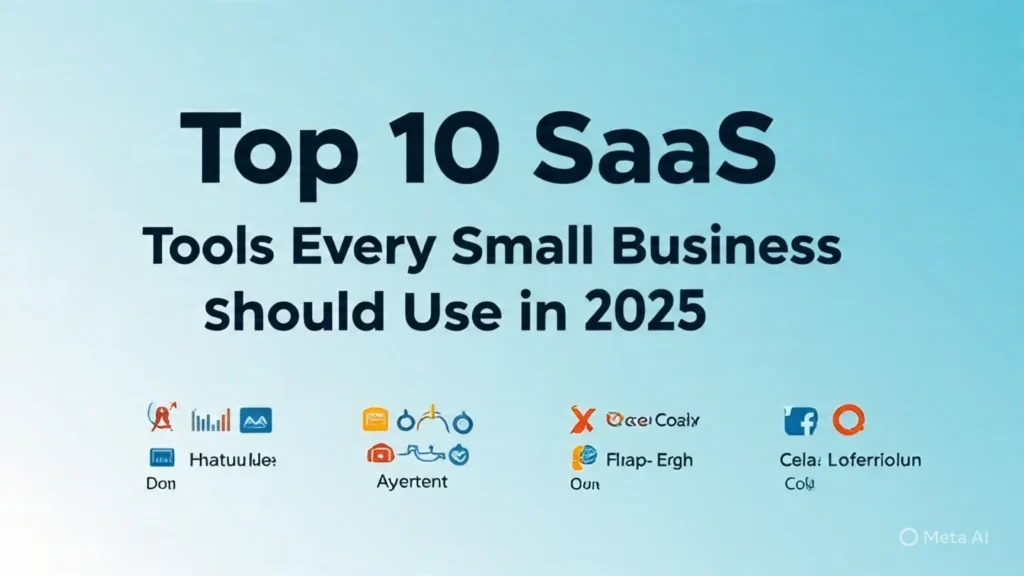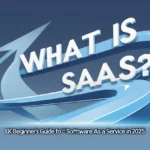Introduction
In 2025, running a small business has never been easier—thanks to powerful and affordable SaaS tools. Whether you’re a solo entrepreneur, startup founder, or small team owner, leveraging the right SaaS tools for small business can help you save time, reduce costs, automate tasks, and grow faster.
But with thousands of tools in the market, how do you know which ones are worth your time and money?
In this guide, we’ll walk you through the top 10 SaaS tools every small business should use in 2025—categorized by key business functions like marketing, finance, communication, and productivity.
Let’s dive in!
What Makes a Great SaaS Tool for Small Businesses?
Before we jump to the list, let’s understand what to look for in a good SaaS tool:
- Affordability – Budget-friendly pricing for small teams
- Ease of Use – Intuitive interface; no tech skills required
- Cloud-Based Access – Work from anywhere
- Scalability – Grows as your business grows
- Integration – Syncs with tools you already use
- Support – Responsive customer service and tutorials
The following tools have been handpicked based on these criteria.
Top 10 SaaS Tools Every Small Business Should Use in 2025
1. Trello (or ClickUp / Asana) – Project Management
What it does: Helps you plan, assign, and manage tasks visually using boards, timelines, and lists.
Key features:
- Drag-and-drop task boards
- Calendar and timeline views
- Collaboration and team tagging
- Automation for task reminders
Pricing: Free plan available; paid plans from $5/user/month
Why it’s great: Easy for beginners, perfect for managing to-do lists or complex team workflows.

2. QuickBooks (or Zoho Books) – Accounting & Invoicing
What it does: Simplifies expense tracking, invoicing, payroll, and tax preparation.
Key features:
- Custom invoices
- Bank account sync
- Expense tracking and reports
- Tax estimations
Pricing: Starts at $15/month
Why it’s great: A lifesaver for non-accountants who want to stay financially organized.
3. HubSpot CRM (or Zoho CRM) – Customer Relationship Management
What it does: Tracks leads, manages customer interactions, and automates follow-ups.
Key features:
- Contact and pipeline management
- Email marketing integration
- Sales dashboard
- Marketing automation tools
Pricing: Free CRM with upgrades for additional features
Why it’s great: Helps you grow relationships without needing a big sales team.
4. Canva – Graphic Design
What it does: Enables you to create professional designs for social media, presentations, posters, and more—no design experience required.
Key features:
- Drag-and-drop editor
- Templates for all formats
- Brand kit for logos and colors
- Team collaboration
Pricing: Free plan; Pro starts at $12.99/month
Why it’s great: Looks like you hired a designer—without the designer cost.
5. Slack – Team Communication
What it does: Centralizes internal team conversations, file sharing, and integrations.
Key features:
- Channels for different projects
- Direct messaging
- File uploads and sharing
- Integration with tools like Google Drive, Trello, and Zoom
Pricing: Free plan; paid plans start at $7.25/user/month
Why it’s great: Keeps your team connected and organized even if they’re remote.
6. Google Workspace (or Microsoft 365) – Productivity & Collaboration
What it does: A complete suite of tools like Gmail, Docs, Sheets, Drive, and Meet for team productivity.
Key features:
- Cloud-based document editing
- Video conferencing via Google Meet
- Real-time collaboration
- Storage via Google Drive
Pricing: Starts at $6/user/month
Why it’s great: All-in-one platform every team member can use from day one.
7. Shopify – E-Commerce Platform
What it does: Enables you to build, manage, and grow your online store.
Key features:
- Drag-and-drop store builder
- Payment gateway integration
- Order and inventory management
- Marketing and SEO tools
Pricing: Starts at $39/month
Why it’s great: Fastest way to get your products online with minimal technical hassle.
8. Mailchimp – Email Marketing Automation
What it does: Helps you send newsletters, automate emails, and grow your email list.
Key features:
- Drag-and-drop email builder
- Automated workflows
- Signup forms
- Audience segmentation
Pricing: Free up to 500 contacts; paid plans start at $13/month
Why it’s great: Simple enough for beginners, yet powerful for scaling campaigns.
9. Grammarly – Writing Assistant
What it does: Helps improve writing for emails, social media posts, blogs, and documents.
Key features:
- Grammar and spell check
- Tone suggestions
- Style and clarity suggestions
- Works across browsers and apps
Pricing: Free plan available; Premium from $12/month
Why it’s great: Makes your business communication more polished and professional.
10. LastPass – Password Manager
What it does: Stores and autofills strong passwords securely across devices.
Key features:
- Secure vault for logins
- Autofill for passwords and forms
- Team management options
- Two-factor authentication
Pricing: Free for personal use; business plans from $4/user/month
Why it’s great: Protects your business accounts without needing IT expertise.
How to Choose the Right SaaS Tools for Your Business
With so many options, choosing the right tools can feel overwhelming. Here’s a quick checklist:
✅ Identify the areas where you need support (e.g., marketing, sales, operations)
✅ Prioritize ease of use and integration
✅ Start with free trials or freemium plans
✅ Read user reviews and case studies
✅ Monitor ROI after 30–60 days
Future Trends: What’s Next in SaaS for Small Businesses?
As technology evolves, here’s what we can expect in the SaaS space:
- AI & Automation: Tools will become smarter and offer predictive suggestions
- No-Code Platforms: Build websites, apps, and automations with zero coding
- Industry-Specific SaaS (Vertical SaaS): Tools tailored for niches like salons, real estate, or fitness studios
- Enhanced Data Security: Better protection against cyber threats
Conclusion
The right SaaS tools for small business can drastically improve your productivity, customer satisfaction, and profitability in 2025. Start with a few from the list above, and scale up as you grow.
Don’t forget: Always choose tools that solve your real problems, not just the trendiest ones.
FAQs
What are SaaS tools for small business?
These are cloud-based applications that help small businesses run operations like marketing, accounting, communication, and customer management.
Are SaaS tools expensive for small businesses?
Not necessarily. Many offer free tiers or low-cost starter plans perfect for small teams.
Can I run my entire business using SaaS tools?
Yes! From website building to payment collection to customer support—SaaS tools can power almost every part of your business digitally.


